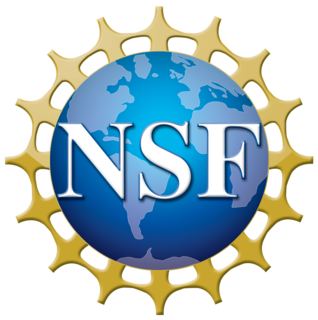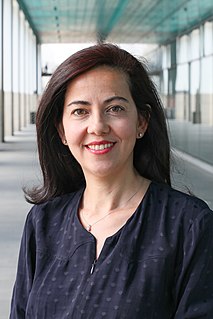
The National Science Foundation (NSF) is an independent agency of the United States government that supports fundamental research and education in all the non-medical fields of science and engineering. Its medical counterpart is the National Institutes of Health. With an annual budget of about US$8.3 billion, the NSF funds approximately 25% of all federally supported basic research conducted by the United States' colleges and universities. In some fields, such as mathematics, computer science, economics, and the social sciences, the NSF is the major source of federal backing.
Research Experiences for Undergraduates are competitive summer research programs in the United States for undergraduates studying science, engineering, or mathematics. The programs are sponsored by the National Science Foundation, and are hosted in various universities. REUs tend to be specialized in a particular field of science. There are REUs in many scientific fields such as mathematics, physics, chemistry, geology, biology, psychology, and computer science.
The Institute for Citizens & Scholars, formerly known as the Woodrow Wilson National Fellowship Foundation, is a private non-profit operating foundation based in Princeton, New Jersey. It administers programs that support leadership development and build organizational capacity in education. Its current signature program is the Woodrow Wilson Teaching Fellowship. Fellowships are granted to develop human resources, improve public policy, and help different organizations and institutions in enhancing practice in the United States as well as other countries worldwide.
The National Center for Engineering and Technology Education is a partnership of four land-grant research universities, five technology teacher education universities and fifteen K–12 school districts. The center was funded by the National Science Foundation in 2004 under NSF program award 0426421.

The America Creating Opportunities to Meaningfully Promote Excellence in Technology, Education, and Science Act of 2007 or America COMPETES Act was authored by Bart Gordon and signed by President George W. Bush; it became law on 9 August 2007. This was an Act, "To invest in innovation through research and development, and to improve the competitiveness of the United States."
The Utah Science Technology and Research Initiative (USTAR) is a technology-based economic development agency funded by the state of Utah. The organization works to develop ideas and research into marketable products and successful companies through its competitive grant and entrepreneur support programs. USTAR facilitates the diversification of the state’s tech economy, increases private follow-on investment, and supports the creation of technology-based start-up firms, higher paying jobs and additional business activity leading to a statewide expansion of Utah’s tax base.
Renée J. Miller is University Distinguished Professor at Northeastern University, a former professor of Computer Science at University of Toronto, Canada, and a Fellow of the Royal Society of Canada.
The Presidential Young Investigator Award (PYI) was awarded by the National Science Foundation of the United States Federal Government. The program operated from 1984 to 1991, and was replaced by the NSF Young Investigator (NYI) Awards and Presidential Faculty Fellows Program (PFF).
Materials Research Science and Engineering Centers (MRSECs) are university based research centers supported by the MRSEC Program of the Division of Materials Research at the National Science Foundation (NSF). The centers support interdisciplinary and multidisciplinary research of fundamental and technological importance and integrate research with education. MRSECs require outstanding research quality, intellectual breadth, support for research infrastructure, and education outreach. MRSECs facilitate active collaborations between academic institutions, national laboratories, and industry, as well international collaborations.
Engineering Research Centers (ERC) are university-led institutions developed through the National Science Foundation (NSF) Directorate of Engineering. While ERCs are initially funded by the NSF, they are expected to be self-sustaining within 10 years of being founded. The Engineering Research Centers program was originally developed in 1984 with the mission of removing disparity between academic and industrial engineering applications. In this way, engineering students would, theoretically, be better prepared to enter the engineering workforce. As a result, the United States would gain a competitive advantage over other countries. There have been three generations of Engineering Research Centers. Each of these generations has been specifically designed to meet the dynamic engineering demands of the United States. Due to the limited amount of funding available for ERCs, the program is competitive; out of 143 proposals submitted in 2008, only 5 were awarded centers. Commercialization of academic research is one of the primary goals of NSF ERCs.

The DO-IT Center is based at the University of Washington (UW) in Seattle, Washington. Founded in 1992, DO-IT’s mission is to increase the successful participation of people with disabilities in postsecondary education and careers, in STEM fields and careers, and in computing fields and careers throughout the U.S. It directs the national AccessSTEM program, and co-directs the national AccessComputing Alliance focused on engaging people with disabilities in computing fields.

Anastasia Ailamaki is a Professor of Computer Sciences at the École Polytechnique Fédérale de Lausanne (EPFL) in Switzerland and the Director of the Data-Intensive Applications and Systems (DIAS) lab. She is also the co-founder of RAW Labs SA, a Swiss company developing real-time analytics infrastructures for heterogeneous big data. Formerly, she was an associate professor of computer science at Carnegie Mellon School of Computer Science.

Massoud Pedram is an Iranian American computer engineer noted for his research in green computing, energy storage systems, low-power electronics and design, electronic design automation and quantum computing. In the early 1990s, Pedram pioneered an approach to designing VLSI circuits that considered physical effects during logic synthesis. He named this approach layout-driven logic synthesis, which was subsequently called physical synthesis and incorporated into the standard EDA design flows. Pedram's early work on this subject became a significant prior art reference in a litigation between Synopsys Inc. and Magma Design Automation.
Chung-Chieh Jay Kuo is a Taiwanese electrical engineer and the director of the Multimedia Communications Lab as well as distinguished professor of electrical engineering and computer science at the University of Southern California. He is a specialist in multimedia signal processing, video coding, video quality assessment, machine learning and wireless communication.
Tracy L. Johnson, is the Keith and Cecilia Terasaki Presidential Endowed Chair and Professor of Molecular, Cell, and Developmental Biology at the University of California, Los Angeles (UCLA). She is also a professor of the of the Howard Hughes Medical Institute.
Laura E. Schulz is a professor of cognitive science in the Brain and Cognitive Sciences department at the Massachusetts Institute of Technology (MIT). She is the Principal Investigator of the Early Childhood Cognition Lab at MIT. She is known for her work on early childhood development of cognition, causal inference, discovery, and learning.
Georgia Perakis is a Greek-American operations researcher and the William F. Pounds Professor of Operations Research and Operations Management at the Sloan School of Management, Massachusetts Institute of Technology (MIT), Cambridge, Massachusetts. Her research is primarily in the areas of dynamic pricing, revenue management and inventory control. In 2016, she was elected as a Fellow of the Institute for Operations Research and the Management Sciences (INFORMS), in recognition of her lifetime achievement in "variational inequalities, the price of anarchy, dynamic pricing and data analytics," and her "dedicated mentorship of a future generation of OR scholars."

Makeba Parramore Wilbourn is an American psychologist and Professor at Duke University. She studies how children acquire knowledge. She was awarded the Presidential Early Career Award for Scientists and Engineers from Barack Obama.
Tara W. Hudiburg is an American forest scientist who specializes in ecosystem modeling. She is an associate professor at the University of Idaho in the department of Forest, Rangeland and Fire Sciences. Hudiburg was honored with the Presidential Early Career Award for Scientists and Engineers in 2019.

Hatice Altuğ is a Turkish physicist and professor in the Bioengineering Department and head of the Bio-nanophotonic Systems laboratory at École Polytechnique Fédérale de Lausanne (EPFL), in Switzerland. Her research focuses on nanophotonics for biosensing and surface enhanced spectroscopy, integration with microfluidics and nanofabrication, to obtain high sensitivity, label-free characterization of biological material. She has developed low-cost biosensor allowing the identification of viruses such as Ebola that can work in difficult settings and therefore particularly useful in case of pandemics.







